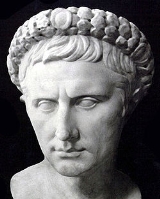
Augustus
Imperator Gaius Julius Caesar Octavianus Augustus (23 September, 63 BC - 19 August, 14), born Gaius Octavius, was the adopted son of Julius Caesar and the first Roman Emperor. He also became a pontiff and later Pontifex Maximus.
Sourced
- If we could survive without a wife, citizens of Rome, all of us would do without that nuisance; but since nature has so decreed that we cannot manage comfortably with them, nor live in any way without them, we must plan for our lasting preservation rather than for our temporary pleasure.
- If I have played my part well, clap your hands, and dismiss me with applause from the stage.
- Statement made as he was dying, as quoted in The Fall of the Roman Empire (2007) by Rita J. Markel, p. 126
- To seek to keep the established constitution unchanged argues a good citizen and a good man.
- Of Cato, as quoted in An Examination of the Isis Cult with Preliminary Exploration into New Testament Studies (2008) by Elizabeth A. McCabe
Res Gestae Divi Augusti
- At the age of nineteen, on my own initiative and at my own expense, I raised an army by means of which I restored liberty to the republic, which had been oppressed by the tyranny of a faction. For which service the senate, with complimentary resolutions, enrolled me in its order...
- Referring to the faction of Marcus Antonius.
- Those who slew my father I drove into exile, punishing their deed by due process of law, and afterwards when they waged war upon the republic I twice defeated them in battle.
- Wars, both civil and foreign, I undertook throughout the world, on sea and land, and when victorious I spared all citizens who sued for pardon. The foreign nations which could with safety be pardoned I preferred to save rather than to destroy.
- I declined to be made Pontifex Maximus in succession to a colleague still living, when the people tendered me that priesthood which my father had held. Several years later I accepted that sacred office when he at last was dead who, taking advantage of a time of civil disturbance, had seized it for himself, such a multitude from all Italy assembling for my election, in the consulship of Publius Sulpicius and Gaius Valgius, as is never recorded to have been in Rome before.
Unsourced
- Young men, hear an old man to whom old men hearkened when he was young.
- Practice, the master of all things.
- Hasten deliberately.
- Variant: Make haste slowly.
- You cheer my heart, who build as if Rome would be eternal.
- Nothing common can seem worthy of you.
- Said of Julius Caesar
- Two Caesars is one too many.
- Said upon ordering the death of Caesarion, son of Cleopatra and (allegedly) Julius Caesar.
- If Agrippa and Maecenas had been alive, they never would have allowed it.
- Said after having lost his temper during a meeting of the Senate
- The birds will soon settle that question
- Said after a request was made by a father and son to have an honorable burial
- May it be my privilege to have the happiness of establishing the commonwealth on a firm and secure basis and thus enjoy the reward which I desire, but only if I may be called the author of the best possible government; and bear with me the hope when I die that the foundations which I have laid for its future government, will stand firm and stable.
- Quintili Vare, legiones redde! (Quintilius Varus, give me back my legions!)
- Said of Publius Quinctilius Varus in response to the loss of 3 legions at the Battle of the Teutoburg Forest
- Livia, keep our marriage alive, and farewell.
- Said to Livia on his deathbed
About Augustus
- He could boast that he inherited it brick and left it marble.
- Suetonius, of Augustus and the city of Rome, in Lives of the Caesars
- He
[ Julius Caesar] learned that Alexander, having completed nearly all his conquests by the time he was thirty-two years old, was at an utter loss to know what he should do during the rest of his life, whereat Augustus expressed his surprise that Alexander did not regard it as a greater task to set in order the empire which he had won than to win it.- Plutarch
- The story of his career shows that Augustus was indeed ruthless, cruel, and ambitious for himself. This was only in part a personal trait, for upper-class Romans were educated to compete with one another and to excel. However, he combined an overriding concern for his personal interests with a deep-seated patriotism, based on a nostalgia of Rome's antique virtues. In his capacity as princeps, selfishness and selflessness coexisted in his mind. While fighting for dominance, he paid little attention to legality or to the normal civilities of political life. He was devious, untrustworthy, and bloodthirsty. But once he had established his authority, he governed efficiently and justly, generally allowed freedom of speech, and promoted the rule of law. He was immensely hardworking and tried as hard as any democratic parliamentarian to treat his senatorial colleagues with respect and sensitivity. He suffered from no delusions of grandeur.
- Anthony Everitt in Augustus : The Life of Rome's First Emperor (2006)
